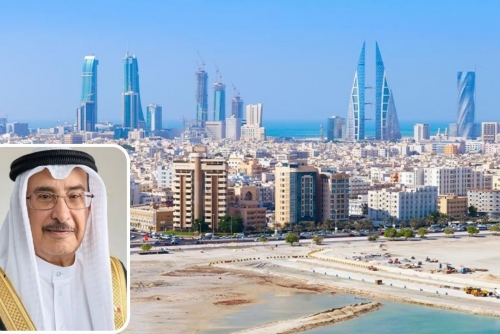Non-Oil GDP hits 86%
TDT | Manama
Email: mail@newsofbahrain.com
Non-oil sectors now contribute approximately 86% of Bahrain’s GDP, according to third-quarter 2024 data announced by Deputy Prime Minister Shaikh Khalid bin Abdullah Al Khalifa.
Shaikh Khalid added that the Kingdom has transformed its economy into one of the most varied in the region, thanks to the guidance of His Majesty King Hamad bin Isa Al Khalifa and the oversight of His Royal Highness Prince Salman bin Hamad Al Khalifa, Crown Prince and Prime Minister.
Progress has been steady, with 68% of planned projects completed by the close of 2024. His remarks came in response to parliamentary questions from MPs Khalid Saleh Buanaq and Abdulwahid Qarata on the progress of the Government Action Plan (2023–2026).
Shaikh Khalid explained that an advanced digital system keeps track of ministries’ work, project timelines and progress, with updates regularly provided to the Cabinet and ministerial committees.
Bahrain has made headway through its Economic Recovery Plan, launched in October 2021. Of 27 programmes, 22 have been completed, focusing on job creation, business efficiency, major development projects, strengthening sectors, and sound public finances. In employment, over 29,000 Bahrainis were hired in both 2022 and 2023, and another 27,147 in 2024, alongside tens of thousands trained, exceeding yearly targets. Foreign investment brought in $2.86 billion by the end of 2023, surpassing earlier goals. Major infrastructure undertakings valued at over $30 billion included the Bapco Modernisation Programme (BMP), King Hamad American Mission Hospital and upgrades to utilities in Hawar Island and East Hidd. Bahrain’s non-oil economy grew by 7.5 per cent in 2022 and 4 per cent in 2023, supported by focused strategies across key industries such as logistics, manufacturing, and finance.
EWA
Infrastructure remains a cornerstone of the government’s efforts. In electricity, new transmission stations, including the Jasra 400 kV station and three 66 kV stations in Karzakan, Northern Riffa and Bilaj AlJazair, have been established. Water supply systems, such as the East Sitra project with 11 million gallons of capacity and new reservoirs in South Saar and Hunainiya holding 22.5 million gallons, have enhanced the kingdom’s water infrastructure.
Kuwait Health Centre
In healthcare, the expansion of the Kuwait Health Centre is nearing completion, while a long-term care hospital in Muharraq has been built, with its inauguration expected soon. By the end of 2024, Bahrain registered 941 healthcare facilities, including 29 hospitals and 368 medical centres, as part of efforts to broaden access to medical services. The ‘Sahati’ insurance scheme is also being developed to streamline health coverage.
Academic buildings
Education has seen similar investment. New academic buildings were added to schools in Riffa, Busaiteen and Qalali, increasing capacity for hundreds of students. Private investment in education surpassed BD 12 million in 2023, demonstrating strong collaboration between the government and local businesses to support infrastructure and training.
Sitra Housing Project
Housing projects continue apace, with 1,269 units completed as part of the third phase of the Sitra Housing Project. Other works in Salman City and Buhair are underway, alongside the redevelopment of older areas such as Muharraq. Plans for Muharraq include 300 new or renovated homes, upgraded services, and the introduction of spaces for tourism and culture.
Tree planting
The environment is also firmly on the agenda. Tree planting, waste management programmes, and updated systems for monitoring air quality have been implemented. Efforts to protect marine life and habitats reflect Bahrain’s focus on balancing growth with ecological care.
Kept inflation low
To ease cost-of-living pressures, the government has kept inflation low at 1.3 per cent during the first half of 2024, compared to a global average of 4.3 per cent. Citizens continue to benefit from a range of support programmes, including allowances for housing, pensions, and disability assistance. Fuel and utility subsidies are maintained for eligible households. The ‘Tamkeen’ Labour Fund has launched initiatives targeting 50,000 Bahrainis, helping to raise wages in the private sector and bolster small businesses.
‘Sijilat 3.0’
Digital transformation has been a key focus, with 695 government services now available online. Upgrades to platforms such as ‘Sijilat 3.0’ and the ‘Tawasul’ national complaints system have streamlined processes for residents and businesses alike. Plans are in place to develop another 300 services, ensuring that the government remains accessible and efficient.
Related Posts

